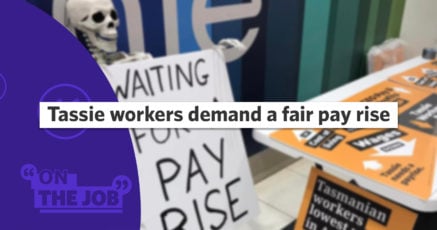Meet one of the frontline workers getting us through this pandemic; veteran registered Nurse Michael Dawes. We catch up with Dawes in our latest “On the Job” episode.
it’s the simple things Dawe takes pleasure in at the end of another long stretch working in ICU dealing with patients stricken by COVID 19.
It’s shedding the PPE he wears, head to toe, for up to 12 hours at a time to do his job. It’s being able to grab a drink when he needs it or a bite to eat without having to climb out of his PPE kit before having to go through the ritual of suiting up again.
Michael Dawe has been nursing for over 25 years. In 2007, after over a decade of working in the high-intensity environment of ICU, he decided that he needed a change.
“For the hours and work-life balance. I needed to find a routine that was more family-friendly,” he told, “On the Job”.
That all changed when the pandemic hit in early 2020.
“Last year they asked people to go back to ICU when the first surge of COVID-19 hit so I put my hand up. I thought I still had something to prove to myself so I hit the books pretty hard to get up to speed.”
“When I first started last year you could just feel the pressure going up each week in terms of getting busier and it wasn’t long before the whole ward was just for COVID patients.”
While Dawe’s sense of duty drew him back to ICU, it was a shock to the system. He found himself slap-bang in the middle of a pandemic response. He had to adjust quickly.
“We do a 12-hour day and it’s mentally draining. It’s a long time to concentrate.”
Anxiety peaked before the vaccine.
“One false step, one lapse in concentration and you could infect yourself. You could bring it home.”
“My wife passed away a couple of years ago. So, you are conscious that as a sole parent you have obligations there. Mentally it was very, very tiring. Physically it was tiring as well. I’d have to take a couple of spare tops to change into throughout a shift because I would just get so sweaty.”
But the silver lining for Dawe’s role is his passion for people. As a younger man he wandered the world for several years meeting people from all walks of life. When he got back to Australia, nursing seemed like a good fit.
‘It’s people. No two people are ever the same. It’s the same reason I love travelling. You meet people from all different backgrounds. Every day you’re at work you can learn something.”
As the pandemic grinds on, Dawe and his colleagues have ridden the ebb and flow of infection surges. The last few months have been hectic.
“The pace has picked up every shift I have gone in. I’ve had guys in their 20’s who have had to be put on an ECMO machine (a blood oxygenator device). These people are right on the edge. That’s what’s stressful.”
The lack of human contact for patients in critical condition is one of the toughest elements of the COVID care protocols.
“A big part of your role was providing emotional support to loved ones and explaining what was going on and giving them time to come to terms with what has happened.”
“This time around we can’t have visitors, so we have to do it all with an iPad. We FaceTime the patients’ families. You’re wearing all the PPE, the patients are hooked up to a ventilator, a lot of them can’t talk. Then the family start talking to them and they’re, getting upset because they can’t respond, and then the family starts getting upset”
Being able to help people on what might be the worst day of their lives drives Dawe despite the personal toll it takes.
His experiences mean he has no tolerance for conspiracy theorists and anti-vaccine protesters who seemingly live in a parallel universe to the one he deals with in a daily basis.
“I wish I could get them to sort of sit with these patients and just see how sick they are and see the families that the disease is impacting on.”
But it’s the comradery between his colleagues that keeps Dawe going.
“The people I work with are amazing. You see a whole different side of people when the sh*t really hits the fan.”
“You know, sometimes at the end of the day you just you just fall in a heap but you work with incredible people that look out for each other.
“We ring each other, and we keep an eye out for each other. We’re all pretty exhausted because this this has been going on for a long time.”
Michael Dawe is looking forward to a few days away from the hospital. He will be back in there and ready to go when his time comes.
It’s just what nurses do.








SHARE:
On the frontline: Back in the ICU to help fight the pandemic